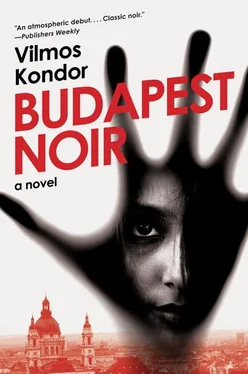“Are you all right, Krisztina?”
“Yes,” she replied. “Better. I wouldn’t have thought this would have made me so upset.”
“Don’t be angry.”
“It’s not your fault.”
“But it is.”
Krisztina pondered the matter for a couple of moments. “Okay, it is. Were they the same people who beat you up?”
“Yes.”
“Do you know who they are?”
“I have a hunch.”
“A hunch.”
“Yes.”
“But you’re not telling me just now.”
“Exactly,” said Gordon, casting his eyes around the newsroom. No one was looking his way. Gömbös belonged to the past, and Gordon’s colleagues were now all busy at work on other stories.
“And?”
“And what?”
“How long are we sentenced to confinement in the flat?”
“When I get home, we’ll talk over everything. Now I’ve got to go. Watch yourselves.” He put down the phone.
For one reason alone, Gordon wasn’t sorry that he was unable to work. In recent days speculation had been rife about whom Kálmán Darányi would invite into the government alongside the National Unity Party. Why was this such a big mystery? He’d invite the same people who’d been there up to now. Horthy had appointed Darányi as prime minister on the day of the funeral, so Darányi had functioned as the acting head of government only for a couple of days, a position that had been a mere formality in any case.
So the newsroom was now abuzz with journalists churning out reports on the formation of the new government. The Budapest Journal was on the desk beside Gordon. He paged through it. Nothing showed Horthy’s confidence in Darányi more than his having appointed him so quickly; and Darányi promptly moved to consolidate the trade and industry ministries, giving István Winchkler the boot, and naming Géza Bornemissza the head of the newly unified ministry. He also replaced the defense minister, Valiant Knight Jozsef Somkuthy, with Vilmos Roder, the general in command of the nation’s infantry. But the government’s key figures would stay right where they were, Gordon surmised. Bálint Hóman would remain culture minister; Tihamér Fabinyi, finance minister; Kálmán Kánya, foreign minister; and, of course, Miklós Kozma, interior minister. Gordon understood the newsworthiness of this; and at the same time, he didn’t. Ultimately, it didn’t matter who was at the helm of the government and who belonged to the cabinet. Nothing would change, anyway. The papers had to appear, and they had to run the news, even if, in fact, it was the same old news.
On Blaha Lujza Square, Gordon boarded Tram No. 4 and once again read thoroughly through Strasser’s notes. He transferred at Kálmán Szell Square to Tram No. 14, got off at the head of Italian Row, and walked from there onto Pasaréti Street. Although his kidneys still throbbed with pain, moving felt good. And it gave him time to ponder what to do next.
There was hardly any traffic on Pasaréti Street. In this neighborhood of villas, a nanny walking a child or pushing a baby carriage occasionally turned up on the sidewalk, but for the most part the apartment buildings stood sullen, unapproachable, and vain behind thick hedges and tall fences. The fallen leaves had been raked up in preparation for winter. Gordon glimpsed gardeners busily at work as he passed by a couple of villas. Smoke poured from the chimneys, but there were few other signs of life.
Forty-eight Pasaréti Street was likewise guarded by a tall fence, but not quite tall enough to block the view of the opulent building behind it. It couldn’t have been built more than ten years ago. Stairs climbed up on both sides to the terrace. The boxed shutters over the second-floor windows were closed, the balcony was empty, and nothing stirred beside its lace curtains. Rows of birch trees populated the yard along with a few other trees, and a magnificent larch at least fifty feet tall was sagging from its many clusters of cones.
Gordon approached the gate and rang the bell. A maid soon appeared, wrapped in a shawl.
“Who are you looking for?” she asked with suspicion.
“I’m from the Evening newspaper, and I’m looking for the master of the house,” replied Gordon in a tone of voice meant to persuade this girl that her only duty was to let him in.
“He is not home. His lordship is in his office.” Chilled by the brisk autumn air, she pulled the shawl tighter around herself. Gordon nodded. This was exactly what he’d expected.
“And her ladyship?”
“She is home.”
“Then what are you waiting for?” Gordon cast her a piercing look. “Let her know I’m here.”
“Yes, sir,” said the girl, opening the door. Gordon followed her into the building. A pleasant warmth enveloped him in the vestibule. He looked around. This home had obviously been arranged with exceptional taste, yet it wasn’t homey in the least. Everything sparkled, everything was lovely, everything was elegant. Gordon handed his jacket and hat to the girl and followed her into the living room. Expensive, massive pieces of furniture greeted him. Persian rugs. Biedermeier armchairs, chairs, and a divan—original, figured Gordon. A crystal chandelier, a Zsolnay vase, and a brocade curtain. As if he were in a museum or in an elegant furniture store, nowhere a personal object, a wrinkle on a tablecloth, nowhere a book left behind. Gordon sat down in the armchair beside the coffee table, which was lovely but uncomfortable. He saw no ashtray on the table. He was adjusting the bandage on his hand when the door opened and in walked Mrs. Szőllősy—a tall, slender woman whose dress swept the floor. Her waist was thin, her back was stiff, and her brown hair, interwoven with gray curls, was tied up in a knot. “Good day,” came the woman’s measured greeting.
“Good day,” replied Gordon, standing up.
“The girl said you came from a newspaper.”
“Yes,” said Gordon. “From the Evening. We’re writing an article about the coffee trade, and I would have liked to speak with your husband.”
The woman seemed to calm down somewhat. She sat on the sofa and rang for the maid. “Would you like some coffee?” she asked Gordon.
“Thank you.”
“Coffee, Anna.”
“Yes, my lady.”
“Why didn’t you look for my husband in his office?” she asked, looking Gordon squarely in the eye.
“Well, I had some business in the neighborhood, and so I thought I’d try to find him at home. He heads a large corporation—perhaps he doesn’t have to go in every day.”
“My husband heads a large corporation precisely because he is in the office every morning at eight. And he works.” With a subtle movement, the woman now adjusted her hair. Gordon saw that the skin on her hand bore the signs of aging. Notwithstanding this, she was in fine form. It was obvious that in her younger days, men had waited in droves to curry her favor. Of course, it must not have been easy for her, what with such a reedy frame, but her regal comportment and her confident expression must surely have shooed away the dowry hunters, the dandies, and the other men buzzing about her without serious intentions.
“I understand. I’d still like to ask a few questions. Just briefly.”
“I am listening.”
“If I’m correct, Arabia Coffee is one of the largest coffee importers alongside Meinl.”
“That is correct.”
“And it has stores not only in Budapest but also in Germany.”
“Yes.”
“In Berlin, Munich, Stuttgart, and Bremen.”
“Nuremberg,” the woman corrected Gordon.
“Yes, Nuremberg. Then your husband must have exceptional contacts.”
“What do you mean by that?” asked the woman, jerking up her head.
Читать дальше
Конец ознакомительного отрывка
Купить книгу












